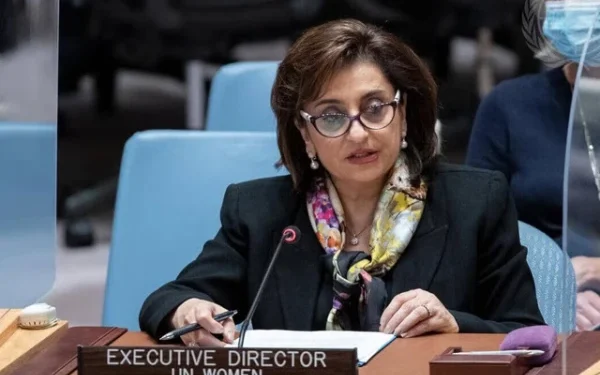Introduction: A Growing Crisis in Girls’ Education
Women’s rights violations under the Taliban regime in Afghanistan have been a source of international concern, with girls’ education among the most critical issues. Since the Taliban took control in August 2021, secondary and higher education institutions for girls have remained closed, depriving millions of Afghan girls of their right to learn. This situation has sparked global outrage, prompting organizations and human rights advocates to urge the Taliban to reverse their restrictive policies.
UN Women’s Dire Warning on Education Ban
The Executive Director of UN Women, Sima Bahous, has sounded the alarm over the increasing restrictions placed on Afghan girls’ education. In a powerful statement, she warned that depriving girls of education in Afghanistan will have lasting consequences for generations to come. She emphasized that denying education to millions of girls not only violates fundamental human rights but also significantly hinders Afghanistan’s social and economic progress.
“The international community must not remain silent,” Bahous asserted. “Education is a fundamental right, and every girl in Afghanistan deserves the opportunity to learn and build a better future.”
The Numbers: A Staggering Educational Setback
With the start of the new academic year in Afghanistan, another 400,000 girls have been forcibly kept out of school due to the Taliban’s education restrictions. This raises the total number of girls deprived of formal education to a shocking 2.2 million. If these restrictions remain in place, UN Women estimates that over 4 million Afghan girls could be out of school by 2030.
Such statistics paint a grim picture of the educational landscape in Afghanistan. Before the Taliban’s takeover, the country had made significant strides in improving literacy and school enrollment rates, particularly for girls. Now, those advancements are rapidly unraveling, further widening gender disparities and increasing long-term socio-economic challenges.
The Global Response and Humanitarian Concern
The international community has condemned the Taliban’s policies, urging the Afghan government to lift restrictions on girls’ education. Various countries, including the United States, the United Kingdom, and members of the European Union, have imposed sanctions and reduced aid to Afghanistan in response to these human rights violations.
Several humanitarian organizations have also stepped in to provide alternative education options, such as underground schools and online learning platforms, to help Afghan girls continue their education. However, these efforts remain insufficient compared to the scale of the crisis.
The Broader Impact of Education Denial
The Taliban’s continued restrictions on girls’ education have severe long-term consequences, both for individuals and for Afghanistan as a whole. Some of the most pressing concerns include:
1. Economic Decline and Workforce Shortage
Educated women play a crucial role in economic development. By denying education to millions of girls, Afghanistan is creating a severe shortage of skilled professionals, further damaging an already fragile economy.
2. Health and Social Consequences
Studies have shown that education is directly linked to improved health outcomes. Girls who receive education are more likely to have healthier families, lower child mortality rates, and better economic opportunities. The lack of education also leaves young women vulnerable to early marriages and exploitation.
3. International Isolation
Afghanistan’s education policies have drawn widespread condemnation, isolating the country from the global community. International funding and development aid are closely tied to human rights benchmarks, and as long as these restrictions remain, Afghanistan risks losing crucial financial and humanitarian support.
Calls for Urgent Action
Sima Bahous and other human rights advocates are calling on the Taliban to urgently lift restrictions on girls’ education. She stressed that immediate action is needed to ensure that Afghan girls do not remain trapped in a cycle of poverty and oppression.
“The future of Afghanistan depends on its youth,” Bahous emphasized. “We must not allow an entire generation of girls to be denied their right to education and the chance to contribute to their country’s growth.”
The UN Women executive director has urged not only the Taliban but also the international community to apply diplomatic and economic pressure on Afghanistan’s leaders to reverse the ban on girls’ education.
Conclusion: A Critical Moment for Afghanistan
The situation in Afghanistan remains dire, with the education ban on girls threatening to undo decades of progress. The global community must continue to advocate for Afghan girls and push for policy changes that restore their fundamental rights. Until meaningful action is taken, millions of girls in Afghanistan remain deprived of a basic necessity—education—that could shape their futures and the future of their nation.
The coming months will be critical in determining whether international efforts and pressure can persuade the Taliban to change course. For now, the fight for Afghan girls’ education continues, as human rights organizations and global leaders remain committed to ensuring that every girl in Afghanistan has the right to learn and build a better future.

























